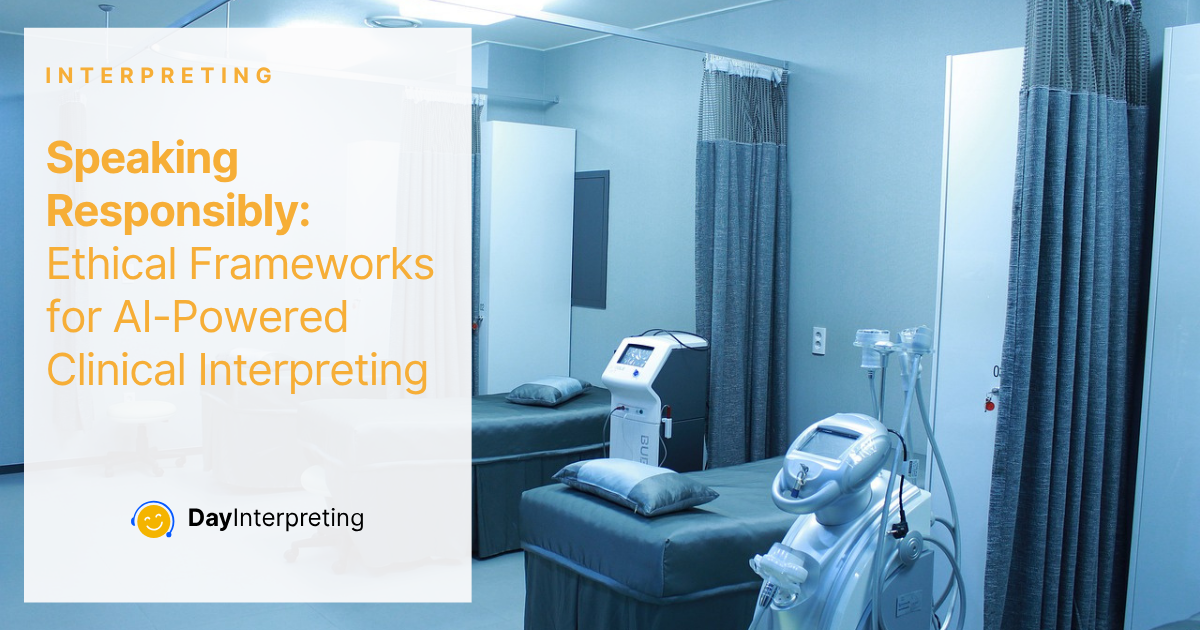As hospitals race to adopt AI-powered clinical interpreting tools, there’s a growing need to slow down and ask: Are we doing this responsibly? When lives, language, and trust are on the line, ethics can’t be an afterthought. Clinical interpreting powered by artificial intelligence brings undeniable benefits, speed, scalability, and 24/7 access, but it also raises thorny questions around privacy, consent, accuracy, and equity.
That’s why ethical frameworks are more important than ever. They’re not about stalling innovation, they’re about making sure this innovation truly works for patients and not despite them.
Core Principles for Ethical AI-Powered Clinical Interpreting
1. Human-Centered Design
At the heart of any ethical AI framework is the principle of patient-centered care. AI interpreting tools must be designed around human needs, not just machine capabilities.
- Do patients know when AI is being used in their care?
- Are they given the choice to request a human interpreter?
- Is the AI flexible enough to recognize cultural nuances?
In ethical deployments, patients are never passive users of the system, they’re informed participants.
2. Transparency and Informed Consent
Patients have the right to know how their language data is being processed. In a clinical setting, this includes:
- Disclosing when AI tools are interpreting vs. when a live interpreter is present.
- Explaining how conversations may be recorded, stored, or shared.
- Offering alternatives when patients are uncomfortable with automated solutions.
Just like with medical procedures, consent matters in communication too.
3. Accuracy and Quality Control
AI interpreting tools must undergo rigorous testing for medical accuracy, cultural competence, and tone sensitivity. Lives may depend on the correct translation of one word, especially in scenarios involving allergies, medication interactions, or mental health crises.
- Is the system tested across different dialects and medical terminologies?
- Is there a human escalation protocol if the AI fails to understand or respond correctly?
Ethical systems recognize their limits and build in safeguards.
4. Equity and Inclusion
Healthcare already struggles with inequities. AI should close those gaps, not widen them. That means:
- Supporting low-resource languages and dialects, not just the most common ones.
- Providing equivalent interpreting options for Deaf and hard-of-hearing patients.
- Ensuring rural or underserved communities are not left out due to tech constraints.
If the system doesn’t work for everyone, it’s not ethical.
5. Data Protection and Patient Privacy
Healthcare AI systems must comply with strict data regulations like HIPAA. But beyond legal compliance, ethical AI should be built with privacy in mind:
- Minimize data collection: Only record what’s necessary.
- Anonymize speech and transcripts where possible.
- Store data securely and limit access to authorized personnel.
The more sensitive the conversation, the higher the privacy stakes. Beyond policies, endpoints used for AI interpreting need hardening. Clinicians and interpreters should secure Windows and macOS devices that handle transcripts with real-time anti-malware and ransomware defense; the good idea is to download antivirus software that protects PCs and Macs, blocks malicious sites, and isolates threats – safeguarding PHI while keeping language access fast and reliable.
6. Accountability and Human Oversight
Even the most advanced AI cannot be entirely autonomous in a clinical setting. Ethical use requires a human safety net.
- Every AI-assisted interpreting session should be traceable.
- Healthcare staff should be trained to intervene when AI output seems flawed.
- Interpreting professionals should have a say in how the tools are developed and implemented.
Accountability means there’s always someone, not just something, responsible.
Examples of Ethical Models in Action
Institutions like Stanford Health and the Mayo Clinic have begun piloting AI interpreting systems with built-in escalation paths to human interpreters. These setups prioritize consent and transparency, informing patients before AI is used and allowing them to opt out.
In the UK, the NHS recently released guidance for digital triage tools that includes ethical guidelines for language access, a model others are watching closely.
Meanwhile, private-sector solutions like Artisight’s voice-activated interpreter access include privacy-first design and integrations with credentialed interpreter networks, demonstrating a hybrid approach to responsibility.
Interpreters Must Be at the Ethics Table
Language professionals are uniquely qualified to spot risks and nuances in communication that developers may overlook. Ethical frameworks must include interpreter input at every stage, from design and testing to implementation and review.
By advocating for interpreter-led oversight, the industry can ensure AI tools are complementing, not replacing, the critical human element in language services.
Why This Matters for the Future of Interpreting
AI will continue to evolve. But the future of interpreting is not machine-only or human-only, it’s a partnership. The interpreters and providers who thrive will be those who can integrate AI tools responsibly, uphold ethical standards, and ensure patient communication remains accurate, empathetic, and empowering.
Ethical frameworks aren’t obstacles to innovation; they’re roadmaps to meaningful progress. And for clinical interpreting, they could make the difference between confusion and clarity, between risk and safety, between treatment and trust.





0 Comments